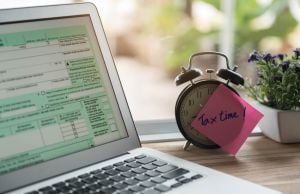NON-RESIDENT TAX
Subscribe to the topic
Post new topic
Why do you have to pay non-resident tax in Spain? I own a property that I do not rent out, I have no rental license. I am an EU citizen. I do not own any other property. Is this just a made-up tax or is there some justification for it?
It’s just the way it is. It’s called imputed tax.
The idea is that the owner has a property they can stay in rent free, si it’s like having an income in kind. If the property is let one pays income tax for the periods it is let.
Tax residents in Spain have to pay the same tax on all properties they own worldwide which do not produce an income, with the exception of their main home. I pay the tax to hacienda on a lock up garage I own in Spain. My wife pays the tax on a property she owns in the Philippines.
Thank you, John
I fully understand that if you own a property and rent it for income, that income would be taxable as a gain.
But if you own a property that you do not rent, have no rental license, there is no income or monetary gain. If you reside in it from time to time rent-free of course, that is because you purchased the property with tax-paid money. This seems like double taxation or more likely a taxation scam.
Does the hacienda consider your lock-up garage your second home?
Re my garage
I posted ‘on all properties worldwide.’
Different countries have different taxes. Spain also has a wealth tax which residents pay if their worldwide wealth exceeds a certain amount. The amounts differ across spain.
In Andalucia it is charged on assets above 1million euros. Non residents pay it if wealth in spain is above 700,000.
Re imputed tax: the nearest example in U.K. that I can think of is like if a person is provided with a car which they can use for personal uses. They are taxed on that.
Of course if one obtains income from renting out a property, income tax is payable due the periods it is let, instead of imputed tax
Hi John and thanks for your help.
I am not a tax resident in Spain and I do not let out my property for income and I do not have a rental license. I purchase my property with my own tax-paid money.
How can it be called a imputed tax when there is no monetary gain or benefit in kind?
Sorry If you can’t understand but I have answered your question a couple of times.
I think I have got it now. You pay non-resident tax to live in your own property because you cannot charge yourself rent. So really it is a special property tax only paid by non-residents even though they are not tax residents.
I really think you are pulling my leg. It’s not difficult to understand if you read what I posted.
Quote.
“Táx residents in Spain have to pay the same tax on all properties they own worldwide which do not produce an income, with the exception of their main home.
I pay the tax to hacienda on a lock up garage I own in Spain.
My wife pays the tax to hacienda in spain on a property she owns in the Philippines.”
I think you are having me on. I am non resident in Spain. I am not tax resident in Spain
You keep quoting tax laws and rules for Spain residents and Spain tax residents.
Guess why I mentioned residents in reply to your post ?
Quote.
“So really it is a special property tax only paid by non-residents”
I think this thread has run its course.
@JaneLoveit
"Why do you have to pay non-resident tax in Spain?"
I agree with you, it's a wacky tax. But it's always a tough job arguing with tax authorities! :-)
"I am an EU citizen."
I don't think this affects it. Plus, since Brexit us Brits are no longer EU citizens.
"I own a property that I do not rent out, I have no rental license. I do not own any other property."
Yes, this is the case the tax applies to (if you are a non-resident for tax purposes).
"Is this just a made-up tax or is there some justification for it?"
Tax authorities don't need much justification. But I suppose the rationale is that foreigners with property are rich, and if they're non-residents then they won't be paying any other taxes, so this is their only shot.
More specifically, it is called the Non-Resident Imputed Income Tax (NRIIT).
Here's a nice explanation from Idealista:
"All non-residents who own property in Spain need to file once a year this testimonial tax.
Even if you do NOT rent out your property in Spain, you still need to pay it.
Also, if you do rent out the property part time during the year, on the days you do not rent out your property in Spain these are taxed as imputed income on a pro rata.
Basically, this tax is a legal fiction whereby it is surmised that you derive some form of financial benefit (income) from your Spanish home; that is why it is called non-resident imputed income tax, as it is deemed income. Spanish Tax Authorities take the view an owner derives a benefit in kind from owning property, irrespective of whether it is true or not, and taxes it accordingly.
Regarding the ongoing pandemic, the Spanish Tax Office takes the view of taxing the days your property stood empty and was not let, despite the mandatory enforced lockdowns.
When is this tax collected?
It is due on the 31st December of each calendar year.
How much is it?
It’s fairly low, normally spanning a few hundred euros.
What happens if I don’t pay it?
You will receive penalties, late interests, and when you sell your property you will forfeit the compulsory 3% non-resident retention on your sales proceeds.
Is there a Statute of Limitations
Yes. Currently, for year 2020, the tax office cannot claim back this tax going further than 2015. So, if you own property in Spain, and are non-resident, you need to file the last 5 years of tax returns to be tax-compliant."
I didn't know about the 3% retention on a sale, so it seems this law does have some teeth. So ignore it at your own risk! (If it's correct that there is both a potential 3% retention, and a statute of limitations, then it appears to me that the cost-effective route is perhaps to ignore it until you want to sell, and then pay the prior 5 years to bring you up to date.)
Idealist don't include how much it is, so the official calculation is:
An imputed income of 1.1 % of the "cadastral value", taxed at the income a tax rate of 24% (or 19% if you are resident in another EU country).
Our humble pad in Elche has a cadastral value of 25,000 euros if I recall correctly. 1.1% of that is 275 euros. 24% of that is 66 euros. It's less than half our IBI, so it's not the most outrageous tax in the world (especially if you add the two, and compare that total to your UK council tax bill). If you own a beachfront mansion in Marbella, then obviously it's a much bigger chunk of cash!
I checked the numbers (by digging out our IBI factura):
The percentage of the catastral value is 2% if last revised before 1994. Otherwise, more recent values at the 1.1% mentioned.
Our place has a catastral value of 21,312 euros last revised in 2001.
Hence the tax base is 1.1% of 21,312 = 234.43.
I am resident in the EU, hence the tax is 19% (instead of 24%) of 234.43 = 44.54 euros.
This year's IBI bill was 186 euros.
Overall, not a massive deal.
As it is a real issue, Spanish attorneys will calculate and file this. I think this service is about 100 euros per year (more if it's a fancy lawyer, of course).
The 3% retention on a sale would be a couple of grand, or about 60 years of this tax!
There is a lot of very clear info on the internet and U.K. and even in english on the tax office’s (Hacienda/AEAT) web page, regarding completing the form 210 for the payment of imputed tax.
The form is completed on line. It can then be printed off and paid over the counter at any bank
Once you have given it a try it’s pretty easy to do.
I have been completing the forms for my son for over 10 years. He has a property jointly owned with his wife, and two other properties. I complete the 4 forms for him and 2 for a friend. The 6 forms take me a total of less than an hour.
gwynj
The idea of paying for the service strikes me as loco and 100 euros is way over the top for a few minute work by a lawyer’s junior typist. !!!!
But how can you be charged non-residence tax (imputed tax) when you were denied access into Spain and your property due to COVID?
You seem to have misunderstood the very simple law office imputed tax
Nowhere does it say you have to use the property. It’s the same as the town hall taxes, IBI, basura, etc.
As I said earlier we tax residents have to pay it on all property we own worldwide
We have a house in the Philippines. It’s not let so no income tax but we pay imputed tax on it to hacienda.
People who live in Spain and have an empty property in U.K. still must pay council tax whether they use it or not. It’s the law ! Even if a Tadd unfair !
@JaneLoveit
The rationale behind the law is to tax non-residents on a property they own, which is available for their own personal use, and which (by definition) they leave empty at least 6 months a year. Looked at this way, it matters not whether you use it for 182 days, or 14 days, or 2 days... or, indeed, zero days.
If you have a property here in Spain, and you're not a Spanish tax resident, then you're liable for this tax. Regardless of your personal feelings about its fairness or reasonableness.
If you feel very strongly about it, you can "vote with your feet" by selling your property and renting one instead, or using the money to buy a property in another country which does not levy such a ridiculous tax. Or, you can simply ignore it, and if/when you come to sell your property, the tax office can have 3% of the sale proceeds instead. (Or, you can become a Spanish tax resident, and pay tax on your actual - rather than "imputed" - income, and then this particular tax doesn't apply.)
Both I and @Johncar have tried to explain what it is, how it works, and how you can pay it. We hope this is helpful for other expats in a similar situation who are concerned about it. In your case, we can appreciate that you feel very strongly about it, but, unfortunately, I doubt this will change whether or not you will be liable for it!
Moreover, given the size of the tax (per my calculations it's about 1/3 of the annual IBI), I'm quite surprised that it inspires such revulsion. I know "it's the principle", but sometimes we need to let the small stuff slide. This is true for many aspects of expat life, as there are lots of things in our new country which aren't done as we're used to, or how our home country does them, or how we think they should be done. It's usually better to focus on the positives (beaches, sunshine, year-round golf, siestas, no council tax) that brought us to Spain in the first place. :-)
You have been very helpful and I thank you for your patience. I have been charged this tax by the Spanish government and also denied no access (zero) to my property by the Spanish government due to COVID. I do not blame anyone for COVID. It is a script for Candid Camera. This tax should at least have been suspended.
You seem a Tadd upset
Articles to help you in your expat project in Valencia
 Taxes in Spain
Taxes in SpainIf you are a foreigner living in Spain for more than 183 days in a calendar year, you are classed as a resident ...
 Paying tax in Spain
Paying tax in SpainUK tax payer – but now living in Spain full time?
 Accommodation in Valencia
Accommodation in ValenciaValencia is the capital of the province of Valencia, a Mediterranean destination of striking architecture, vast ...
 Working in Valencia
Working in ValenciaValencia is the capital of the autonomous community of Valencia, an attractive port city with beautiful beaches, a ...
 From Grail to Whale, Valencia attractions
From Grail to Whale, Valencia attractionsFrom Grail to Whale - Words by Rob Innis
 Accommodation in Seville
Accommodation in SevilleSeville is a southern Andalusian city that's easy to fall in love with. The Moorish architecture works of art, ...
 Choosing your neighbourhood in Madrid
Choosing your neighbourhood in MadridLocation is probably the most important determining factor when purchasing a home. You see, no matter how much you ...
 Accommodation in Tenerife
Accommodation in TenerifeTenerife is the largest and most populous of the seven Canary Islands, a Spanish archipelago in the Atlantic Ocean ...
Find more topics on the Valencia forum



